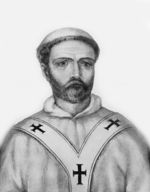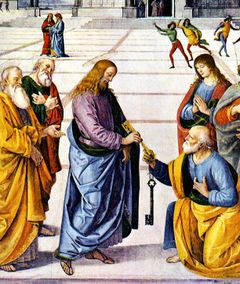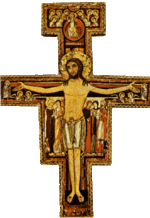Pope John XI
| John XI | |
|---|---|
 |
|
| Papacy began | March 931 |
| Papacy ended | December 935 |
| Predecessor | Stephen VII |
| Successor | Leo VII |
| Personal details | |
| Birth name | Johannes |
| Born | 910? Rome, Italy |
| Died | December, 935 Rome, Italy |
| Other Popes named John | |
John XI (910? – December 935) was a Pope from March 931 (at the age of 20) to December 935.
Contents |
Parentage
The parentage of John XI is still a matter of dispute. According to Liutprand of Cremona (Antapodosis, ii. c. 48) and the "Liber Pontificalis," he was the natural son of Pope Sergius III (904–911), ("Johannes, natione Romanus ex patre Sergio papa," "Liber Pont." ed. Duchesne, II, 243). Ferdinand Gregorovius,[1] Ernst Dümmler, Thomas Greenwood (Cathedra Petri: A Political History of the great Latin Patriarchate), Philip Schaff, and Rudolf Baxmann[2] agree with Liutprand that Pope Sergius III fathered Pope John XI by Marozia. If that is true, John XI would be the only known illegitimate son of a Pope to have become Pope himself. (Silverius was the legitimate son of Pope Hormisdas). On the other hand, Horace Kinder Mann,[3] Reginald L. Poole,[4] Peter Llewelyn (Rome in the Dark Ages), Karl Josef von Hefele, August Friedrich Gfrörer,[5] Ludovico Antonio Muratori, and Francis Patrick Kenrick[6] maintain that Pope John XI was sired by Alberic I of Spoleto, Count of Tusculum.
Pontificate
His mother was the Roman ruler at the time, resulting in his appointment to the Chair of Peter. Marozia was thus allegedly able to exert complete control over the Pope.
At the overthrow of Marozia around 932, John XI reportedly became subject to the control of Alberic II, his younger brother. The only control left to the Pope was the exercise of his purely spiritual duties. All other jurisdiction was exercised through Alberic II. This was not only the case in secular, but also in ecclesiastical affairs.
It was at the insistence of Alberic II that the pallium was given to Theophylactus, Patriarch of Constantinople (935), and also to Artold, Archbishop of Reims (933). It was John XI who sat in the Chair of Peter during what some traditional Catholic sources consider its deepest humiliation, but it was also he who granted many privileges to the Congregation of Cluny, which was later on a powerful agent of Church reform.
See also
- Pornocracy
References
- ↑ Gregorovius, Ferdinand (1903), The History of the City of Rome in the Middle Ages, III (2nd ed.), London: George Bell & Sons, pp. 254, http://books.google.com/books?id=tLk4AAAAIAAJ&printsec=titlepage#PPA254,M1, retrieved 2008-01-06.
- ↑ Baxmann, Rudolf (1869), Die Politik der Päpste von Gregor I. bis Gregor VII, II, Elberfeld, pp. 58–125.
- ↑ "Sergius at once declared the ordinations conferred by Formosus null; but that he put his two predecessors to death, and by illicit relations with Marozia had a son, who was afterwards John XI, must be regarded as highly doubtful. These assertions are only made by bitter or ill-informed adversaries, and are inconsistent with what is said of him by respectable contemporaries [such as Flodoard]." Mann, Horace Kinder (1912), "Sergius III", The Catholic Encyclopedia (New York: Robert Appleton Company) XIII, http://www.newadvent.org/cathen/13729a.htm, retrieved 2008-01-06.
- ↑ Poole, Reginald L. (1917). "Benedict IX and Gregory VI". Proceedings of the British Academy 8: 230.
- ↑ Gfrörer, August Friedrich, Allgemeine Kirchengeschichte, III, Stuttgart: A. Krabbe, pp. 1133–1275, http://www.archive.org/details/a5831149p103gfrouoft, retrieved 2008-01-06.
- ↑ Kenrick, Francis Patrick (1855), The Primacy of the Apostolic See Vindicated, Baltimore: John Murphy & Co., pp. 418, http://books.google.com/books?id=EXFCAAAAIAAJ&pg=PA418, retrieved 2008-01-06.
- Marozia
 This article incorporates text from a publication now in the public domain: Chisholm, Hugh, ed (1911). Encyclopædia Britannica (Eleventh ed.). Cambridge University Press.
This article incorporates text from a publication now in the public domain: Chisholm, Hugh, ed (1911). Encyclopædia Britannica (Eleventh ed.). Cambridge University Press.
External links
| Catholic Church titles | ||
|---|---|---|
| Preceded by Stephen VII |
Pope 931–935 |
Succeeded by Leo VII |
|
|||||||||||||||||||||||||||||||||||||||||||||
|
|||||||||||||||||||||||||||||||||||||||||

